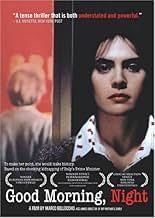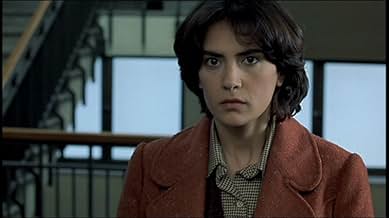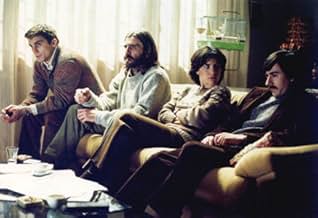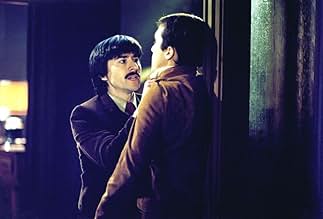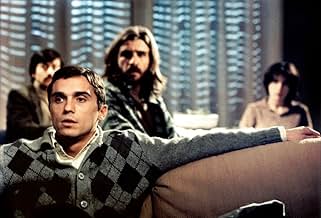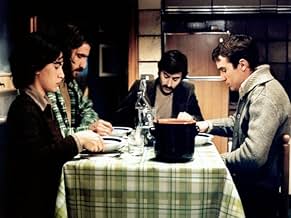CALIFICACIÓN DE IMDb
7.1/10
4.2 k
TU CALIFICACIÓN
El secuestro del político Aldo Moro de 1978 visto desde la perspectiva de uno de sus atacantes: una joven conflictiva de las filas de la Brigada Roja.El secuestro del político Aldo Moro de 1978 visto desde la perspectiva de uno de sus atacantes: una joven conflictiva de las filas de la Brigada Roja.El secuestro del político Aldo Moro de 1978 visto desde la perspectiva de uno de sus atacantes: una joven conflictiva de las filas de la Brigada Roja.
- Dirección
- Guionistas
- Elenco
- Premios
- 13 premios ganados y 21 nominaciones en total
Giulio Bosetti
- Paolo VI
- (as Giulio Stefano Bosetti)
Opiniones destacadas
Based on a novel, the film describes the situation of Aldo Moro during his captivity. There is more than a meticulous realistic point of view given in this film : it tries to figure thoughts and attitudes of the kidnappers, members of brigate rosse. It explores the contradictions of hidden activists who are desperately trying to justify violent actions by the salvation of proletariat and rise of a social justice. They are seen in their loneliness, especially on the affective, emotional side. The psycho-rigidity of their mind is patent, not only in the sententious talks to their prisoner, in a certain desperate naivety to seek echos of their action in public opinion throughout medias, but also in the way they rule relationships. It's not politically that Moro's character strongly opposes to his kidnappers' characters, but rather in the way he's emotionnaly tied to his family (although being a prisonner, he can write letters), while the others seem alienated facing their own families (Mariano pretends to have cut any link to his son, Chiara tries to avoid familial phone calls and meetings, another member is mad about being away of his girl and suffers to be away from her mind and point of view when he sees her). Together, those members don't look like a family of a new kind. Maybe is it the main limit of Bellochio's movie, not to explore the way such an internal and autistic logical builds inside radical groups. But the movie spots a clearly defined place and time, focusing exclusively on elements linked to Moro's detention in a casual apartment (the gunfight of the kidnapping and then the death of the prisonner are seen indirectly throughout television). The strength of the movie is to develop a symbolic aspect with the character of Chiara's colleague (of her cover work) who defends imagination against the brutality of autocratic arbitrary. Almost fantastically, this character seems to guess Chiara's situation, writing a fiction about the events (like the movie we're effectively seeing as spectators) and modifying her feelings : when she realizes how any execution is horrible and unfair (reminding executions of italian partisani of WWII), it's too late and there is no other escape than in her own imagination (dream-like scene that the film also shows us). I believe it's a good and clever way to introduce us into such a historical event (maybe still wounding italian society), imagination. I also like the aspects and details of the movie that describe the importance of christianity in the conscience of the italians (even marxists ones, subconsciously) and critizises the sacrificial consensus into a falsely ineluctable execution but real murder.
This is a very good docu-drama about a kidnapping and assassination of a former Prime Minister Aldo Moro of Italy in 1978 by the Red Brigades. Pretty much the whole movie takes place in the hideout where they are keeping the politician, trying to negotiate a change in government and even getting the Pope involved. One of the most amazing things about the movie to me, outside of excellent story telling, is the use of Pink Floyd music. There's not too many movies that get the right to use PF music, but this movie does with "Shine on you crazy Diamond" and "The Great Gig in the Sky". Extremely powerful music to establish tone and mood in the movie, and very effective. I thoroughly enjoyed this movie, and the DVD documentary extra is very good too. It gives a great background to the true story, and a good profile of the filmmaker.
I won't comment on the film's artistic merits, which I regard as noteworthy, nor on the psychological portrait given of the brigatisti, which I thought interesting but flawed. I will only say that the film was deeply moving for me and had me crying uncontrollably at times. I wish to give, instead, a sketch of the film's political context for the benefit of those whose familiarity with that period in Italian politics may be limited.
By 1978 Italy had been ruled uninterruptedly for more than 30 years by coalition governments, all of which were dominated by the Christian-Democratic party (DC). The Italian Communist Party (PCI) had been thrown out of the government in 1947 (in part, on the insistence of Washington as a condition for Italy's receiving Marshall aid monies), and it was excluded from all governments even though its share of the popular vote rose with every post-war election, making it the second largest party in Italy (it peaked at more than a third of the vote in the late 1970s). The PCI was not your average Communist party. It espoused a route to the transformation of capitalism that emphasized gradualism, social mobilization, and electoral politics--and by the early '60s its commitment to the acceptance of the principles of democratic pluralism was public and pronounced. By the end of the '70s, Italy was sorely in need of reform--the kind of reform in institutional arrangements and socio-economic policies that could only come through a change in government.
The 30 years of DC rule had created a regime rent through and through with corruption and unresponsive government (by contrast with the regional governments run by the PCI, which were models of efficiency and responsive government). But the US and most of the DC continued to argue that the opposition should not be allowed to come to power under any circumstances because of the "Communist menace."
Aldo Moro, president of the DC at the time, was one of a few DC leaders receptive to the idea of bringing the PCI into the government to effect reforms and make the country more governable--responding, as he was, to the initiative of Enrico Berlinguer, leader of the PCI, who called for an "historic compromise" with the Catholic masses and their party. But at the same time that the PCI was inching towards the government, there were fractions of the left in Italy that felt that the PCI was selling out the dream of making "The Revolution". Certainly it was true that the PCI had long abandoned the notion of "Revolution in the West" as resembling anything like the storming of the Winter Palace in St. Petersburg in 1917 (note the imagery of revolutionary Russia thrown into the film by Bellocchio as representative of the consciousness of the brigatisti). But the PCI continued to be nominally wedded to the idea that capitalism was not the final resting place in the evolution of human social-economic systems, and that it could and should be replaced by a system of production based on production to satisfy human needs rather than private profit.
The closer the PCI moved towards government and compromise with the DC, the more this commitment to a socio-economic order alternative to capitalism was put into question in the eyes of Italy's "revolutionary" left (all of which, by the way,existed outside of the PCI in other social and political organizations).
Enter the Red Brigades (BR). Most of the their ranks were filled with leftists who came to "revolutionary" politics via Catholicism and the social gospel. They believed themselves to be heirs to the tradition of revolutionary militancy (and armed struggle)embodied in the Resistenza, the struggle against the German occupation of Italy,1943-45--a struggle which, in the minds of many of the combatants, was waged for the sake of a socio-economic order alternative to the inequalities and irrationalities of capitalism (it was mainly Bellocchio's use of clips showing the execution of "partigiani" (resistance fighters) and the reading of the letters they had written just prior to their execution which brought me to tears).
The BR believed that through "exemplary" actions (the knee-capping or killing of politicians, journalists, and trade-unionists seen by them as enemies of the working class) they might be able to galvanize the masses of the working class, whose revolutionary militancy had, presumably, had been lulled into a quiescent state by the "sell-out" leadership of the PCI.
The kidnapping of Moro was designed to put a stop to that process, and indeed it succeeded well. To the delight both of the "revolutionary" left and Washington the PCI was kept out of the government for almost another 20 years, until after the fall of the USSR and the complete dissolution of the DC under the weight of a gigantic scandal. One side note: Bellocchio is certainly in error in suggesting that Stalin would have been part of the fantasies of the BR--while they greatly admired Lenin for having pulled off the Bolshevik Revolution, they detested Stalin and the bureaucratized party rule that came in his wake.
One final note: I'm not sure I understand why Bellocchio has chosen as his counter-hero a figure who suggests the use of "fantasia" as an alternative to violence. It was precisely the BR's "flight of imagination" that got them into trouble, imagining a world that didn't exist in Italy--a world of revolutionary seething masses just waiting for a spark to ignite them. In politics there's no substitute for Machiavelli's "chiaroveggenza" (the capacity to see things clearly).
By 1978 Italy had been ruled uninterruptedly for more than 30 years by coalition governments, all of which were dominated by the Christian-Democratic party (DC). The Italian Communist Party (PCI) had been thrown out of the government in 1947 (in part, on the insistence of Washington as a condition for Italy's receiving Marshall aid monies), and it was excluded from all governments even though its share of the popular vote rose with every post-war election, making it the second largest party in Italy (it peaked at more than a third of the vote in the late 1970s). The PCI was not your average Communist party. It espoused a route to the transformation of capitalism that emphasized gradualism, social mobilization, and electoral politics--and by the early '60s its commitment to the acceptance of the principles of democratic pluralism was public and pronounced. By the end of the '70s, Italy was sorely in need of reform--the kind of reform in institutional arrangements and socio-economic policies that could only come through a change in government.
The 30 years of DC rule had created a regime rent through and through with corruption and unresponsive government (by contrast with the regional governments run by the PCI, which were models of efficiency and responsive government). But the US and most of the DC continued to argue that the opposition should not be allowed to come to power under any circumstances because of the "Communist menace."
Aldo Moro, president of the DC at the time, was one of a few DC leaders receptive to the idea of bringing the PCI into the government to effect reforms and make the country more governable--responding, as he was, to the initiative of Enrico Berlinguer, leader of the PCI, who called for an "historic compromise" with the Catholic masses and their party. But at the same time that the PCI was inching towards the government, there were fractions of the left in Italy that felt that the PCI was selling out the dream of making "The Revolution". Certainly it was true that the PCI had long abandoned the notion of "Revolution in the West" as resembling anything like the storming of the Winter Palace in St. Petersburg in 1917 (note the imagery of revolutionary Russia thrown into the film by Bellocchio as representative of the consciousness of the brigatisti). But the PCI continued to be nominally wedded to the idea that capitalism was not the final resting place in the evolution of human social-economic systems, and that it could and should be replaced by a system of production based on production to satisfy human needs rather than private profit.
The closer the PCI moved towards government and compromise with the DC, the more this commitment to a socio-economic order alternative to capitalism was put into question in the eyes of Italy's "revolutionary" left (all of which, by the way,existed outside of the PCI in other social and political organizations).
Enter the Red Brigades (BR). Most of the their ranks were filled with leftists who came to "revolutionary" politics via Catholicism and the social gospel. They believed themselves to be heirs to the tradition of revolutionary militancy (and armed struggle)embodied in the Resistenza, the struggle against the German occupation of Italy,1943-45--a struggle which, in the minds of many of the combatants, was waged for the sake of a socio-economic order alternative to the inequalities and irrationalities of capitalism (it was mainly Bellocchio's use of clips showing the execution of "partigiani" (resistance fighters) and the reading of the letters they had written just prior to their execution which brought me to tears).
The BR believed that through "exemplary" actions (the knee-capping or killing of politicians, journalists, and trade-unionists seen by them as enemies of the working class) they might be able to galvanize the masses of the working class, whose revolutionary militancy had, presumably, had been lulled into a quiescent state by the "sell-out" leadership of the PCI.
The kidnapping of Moro was designed to put a stop to that process, and indeed it succeeded well. To the delight both of the "revolutionary" left and Washington the PCI was kept out of the government for almost another 20 years, until after the fall of the USSR and the complete dissolution of the DC under the weight of a gigantic scandal. One side note: Bellocchio is certainly in error in suggesting that Stalin would have been part of the fantasies of the BR--while they greatly admired Lenin for having pulled off the Bolshevik Revolution, they detested Stalin and the bureaucratized party rule that came in his wake.
One final note: I'm not sure I understand why Bellocchio has chosen as his counter-hero a figure who suggests the use of "fantasia" as an alternative to violence. It was precisely the BR's "flight of imagination" that got them into trouble, imagining a world that didn't exist in Italy--a world of revolutionary seething masses just waiting for a spark to ignite them. In politics there's no substitute for Machiavelli's "chiaroveggenza" (the capacity to see things clearly).
Aldo Moro's kidnapping and murder was at its time a huge event for the Italian history and the world. With the recrudescence of terrorism at the beginning of the 70s, some of the extreme left movements in Europe - especially in Germany and Italy - embraced the path of the 'armed struggle', a deformation of the Marxist concept of class struggle in a try to stop the historical reconciliation between the traditional political parties and an Italian Comminist Party already feeling the winds of reform that will melt down the Iron Curtain 10-15 years later.
Marco Bellocchio's film tackles the story from the perspective of the day to day life of the kidnappers, and through the eyes and dreams of one of the kidnappers - the only female in the group. We do not see any of the bloody events of the kidnapping or the outcome, and most of the action happens in the rented flat where the captors kept Moro imprisoned. The director and the splendid main actress Maya Sansa succeed to re-create the political conditioning and the motivations that brought the young woman to join the terrorist fighting path, but also the human dimension that brings her back the feelings of compassion to the victim. It is Aldo Moro's portrait played by Roberto Herlitzka which seems surprinsigly more sketchy, and I had the feeling that a greater message about the relationship between kidnapper and victim was missed.
It is still an interesting movie to watch, minor in style but human, dealing from a different perspective with a theme that too often generated films that were spectacular, but deprived of any true emotion. 8 out of 10 on my personal scale.
Marco Bellocchio's film tackles the story from the perspective of the day to day life of the kidnappers, and through the eyes and dreams of one of the kidnappers - the only female in the group. We do not see any of the bloody events of the kidnapping or the outcome, and most of the action happens in the rented flat where the captors kept Moro imprisoned. The director and the splendid main actress Maya Sansa succeed to re-create the political conditioning and the motivations that brought the young woman to join the terrorist fighting path, but also the human dimension that brings her back the feelings of compassion to the victim. It is Aldo Moro's portrait played by Roberto Herlitzka which seems surprinsigly more sketchy, and I had the feeling that a greater message about the relationship between kidnapper and victim was missed.
It is still an interesting movie to watch, minor in style but human, dealing from a different perspective with a theme that too often generated films that were spectacular, but deprived of any true emotion. 8 out of 10 on my personal scale.
"Good Morning, Night (Buongiorno, notte)" is an intriguing effort to understand terrorists.
Loosely based on a novel, writer/director Marco Bellocchio specifically re-imagines the kidnapping of Italian party leader Aldo Moro in 1987, with heavy use of television clips. The quaintly naive Cold War rhetoric, emphasized with odd historic black and white newsreel interstices such as of Stalinist parades, may now be seen as an examination of a symbolic precursor for today's gruesome politics, though he was already working on the film at 9/11.
The young idealists we are first introduced to seem as harmless as the radical pranksters in the contemporary "The Edukators (Die Fetten Jahre sind vorbei)." While it's a jolt to gradually learn their connection to the violent attack, first revealed as they cheer at the initial TV coverage, they seem so bumbling and nervous (one takes leave abruptly for, as it were, a conjugal visit as he feels he's the one being imprisoned; another gets fixated on an overly symbolic pet caged bird), it's never clear if they personally committed murder or if they're just the guardian cell taking orders from those who stage the mock trial and pull the triggers or if that is a moral difference that is intentionally considered irrelevant.
Real world politics do occasionally seep through in silent background commentary, through factory strikes and sarcastic graffiti, but the determined ideologues reject these actions as they see themselves as the true believers. Ironically, the drone of the TV coverage, with reports of related and unrelated violent acts around the country, they anxiously watch becomes as much a recitation as the opening pitch from the bored apartment rental agent.
Their Red Brigade aims seem so diffuse about intending to set off revolutions and counter-revolutions, compared to the more direct motives of the terrorists in "Paradise Now" (let alone how kidnapping has devolved into a business, as in "Secuestro Express"), at least to those not intimately familiar with Italian political dialectics, that it seems more understandable than ludicrous that the negotiations draw on. A long side bar scene where one of the kidnappers joins her family in a memorial service for World War II partisans nostalgically singing an anti-Fascist anthem, inspiring her to read a collection of letters resistance fighters wrote before their executions instead of her usual Lenin or Engels reading, makes the dialectics even more ironic as to what fascist behavior is. Her internal struggle to resolve these pressures, including several confusing dream sequences, is the core of the film and Maya Sansa, with very expressive eyes, is captivating as "Chiara."
The kidnapping itself takes on a "Ransom of Red Chief" feel as the Aldo Moro character, well-played by Roberto Herlitzka and the point of the film's dedication to the auteur's father, is much more of an eloquent, dignified, paternal humanist statesman than a typical politician. The kidnappers seem to be thwarted in provoking political crisis because he will only write personal, non-political notes to his family, particularly his grandson (even if does seem as if he's writing love notes to his mistress rather than to his wife). But his appeal to the pope and the pope's involvement in the negotiations and their aftermath seems as incongruous as an odd séance by political supporters or the kidnappers doing a blessing before eating. Compared to the director's earlier "My Mother's Smile (L'Ora di religione: Il sorriso di mia madre)," religion is only an ancillary issue.
The auteur's voice, as an artist, seems to speak through a somewhat naive and flirtatious friend of "Chiara"s who has written a screenplay about radicals and quotes the Emily Dickinson poem that inspired the title. He argues that the imagination can be a powerful force in influencing people, though of course the authorities misinterpret his involvement.
I saw it with a defective soundtrack, but other than odd musical commentary with bombastic selections from "Aida" and Pink Floyd, the film's strength is faces and looking into the eyes of deluded cogs in the wheel of historical forces, though the best sequence is given away in the trailer.
Loosely based on a novel, writer/director Marco Bellocchio specifically re-imagines the kidnapping of Italian party leader Aldo Moro in 1987, with heavy use of television clips. The quaintly naive Cold War rhetoric, emphasized with odd historic black and white newsreel interstices such as of Stalinist parades, may now be seen as an examination of a symbolic precursor for today's gruesome politics, though he was already working on the film at 9/11.
The young idealists we are first introduced to seem as harmless as the radical pranksters in the contemporary "The Edukators (Die Fetten Jahre sind vorbei)." While it's a jolt to gradually learn their connection to the violent attack, first revealed as they cheer at the initial TV coverage, they seem so bumbling and nervous (one takes leave abruptly for, as it were, a conjugal visit as he feels he's the one being imprisoned; another gets fixated on an overly symbolic pet caged bird), it's never clear if they personally committed murder or if they're just the guardian cell taking orders from those who stage the mock trial and pull the triggers or if that is a moral difference that is intentionally considered irrelevant.
Real world politics do occasionally seep through in silent background commentary, through factory strikes and sarcastic graffiti, but the determined ideologues reject these actions as they see themselves as the true believers. Ironically, the drone of the TV coverage, with reports of related and unrelated violent acts around the country, they anxiously watch becomes as much a recitation as the opening pitch from the bored apartment rental agent.
Their Red Brigade aims seem so diffuse about intending to set off revolutions and counter-revolutions, compared to the more direct motives of the terrorists in "Paradise Now" (let alone how kidnapping has devolved into a business, as in "Secuestro Express"), at least to those not intimately familiar with Italian political dialectics, that it seems more understandable than ludicrous that the negotiations draw on. A long side bar scene where one of the kidnappers joins her family in a memorial service for World War II partisans nostalgically singing an anti-Fascist anthem, inspiring her to read a collection of letters resistance fighters wrote before their executions instead of her usual Lenin or Engels reading, makes the dialectics even more ironic as to what fascist behavior is. Her internal struggle to resolve these pressures, including several confusing dream sequences, is the core of the film and Maya Sansa, with very expressive eyes, is captivating as "Chiara."
The kidnapping itself takes on a "Ransom of Red Chief" feel as the Aldo Moro character, well-played by Roberto Herlitzka and the point of the film's dedication to the auteur's father, is much more of an eloquent, dignified, paternal humanist statesman than a typical politician. The kidnappers seem to be thwarted in provoking political crisis because he will only write personal, non-political notes to his family, particularly his grandson (even if does seem as if he's writing love notes to his mistress rather than to his wife). But his appeal to the pope and the pope's involvement in the negotiations and their aftermath seems as incongruous as an odd séance by political supporters or the kidnappers doing a blessing before eating. Compared to the director's earlier "My Mother's Smile (L'Ora di religione: Il sorriso di mia madre)," religion is only an ancillary issue.
The auteur's voice, as an artist, seems to speak through a somewhat naive and flirtatious friend of "Chiara"s who has written a screenplay about radicals and quotes the Emily Dickinson poem that inspired the title. He argues that the imagination can be a powerful force in influencing people, though of course the authorities misinterpret his involvement.
I saw it with a defective soundtrack, but other than odd musical commentary with bombastic selections from "Aida" and Pink Floyd, the film's strength is faces and looking into the eyes of deluded cogs in the wheel of historical forces, though the best sequence is given away in the trailer.
¿Sabías que…?
- TriviaWas appreciated by the relatives of Aldo Moro.
- ErroresNear the end, when Aldo Moro walks away in the deserted street, you can see a multicolored Peace flag in the background. Those flags would decorate Italian streets only in 2003, to oppose the invasion of Iraq.
- ConexionesEdited from Paisà (1946)
- Bandas sonorasMarcia trionfale
(from "Aida")
Composed by Giuseppe Verdi
Performed by Orchestra e Coro del Teatro dell'Opera di Roma
Conducted by Georg Solti
Decca Records, 1962
Selecciones populares
Inicia sesión para calificar y agrega a la lista de videos para obtener recomendaciones personalizadas
- How long is Good Morning, Night?Con tecnología de Alexa
Detalles
Taquilla
- Total en EE. UU. y Canadá
- USD 10,093
- Fin de semana de estreno en EE. UU. y Canadá
- USD 2,769
- 13 nov 2005
- Total a nivel mundial
- USD 4,240,918
- Tiempo de ejecución1 hora 46 minutos
- Color
- Mezcla de sonido
- Relación de aspecto
- 1.66 : 1
Contribuir a esta página
Sugiere una edición o agrega el contenido que falta

Principales brechas de datos
By what name was Buenos Días, Noche (2003) officially released in India in English?
Responda
